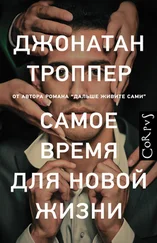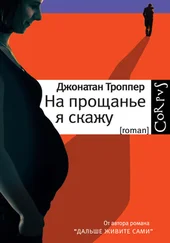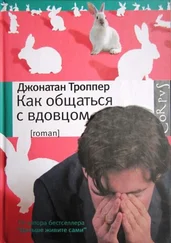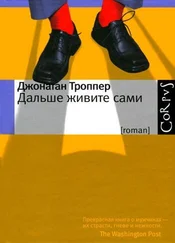Джонатан Троппер - This Is Where I Leave You
Здесь есть возможность читать онлайн «Джонатан Троппер - This Is Where I Leave You» весь текст электронной книги совершенно бесплатно (целиком полную версию без сокращений). В некоторых случаях можно слушать аудио, скачать через торрент в формате fb2 и присутствует краткое содержание. Год выпуска: 2009, ISBN: 2009, Издательство: Penguin Group (USA), Inc., Жанр: Проза, на английском языке. Описание произведения, (предисловие) а так же отзывы посетителей доступны на портале библиотеки ЛибКат.
- Название:This Is Where I Leave You
- Автор:
- Издательство:Penguin Group (USA), Inc.
- Жанр:
- Год:2009
- ISBN:978-1-101-10898-7
- Рейтинг книги:5 / 5. Голосов: 1
-
Избранное:Добавить в избранное
- Отзывы:
-
Ваша оценка:
- 100
- 1
- 2
- 3
- 4
- 5
This Is Where I Leave You: краткое содержание, описание и аннотация
Предлагаем к чтению аннотацию, описание, краткое содержание или предисловие (зависит от того, что написал сам автор книги «This Is Where I Leave You»). Если вы не нашли необходимую информацию о книге — напишите в комментариях, мы постараемся отыскать её.
This Is Where I Leave You — читать онлайн бесплатно полную книгу (весь текст) целиком
Ниже представлен текст книги, разбитый по страницам. Система сохранения места последней прочитанной страницы, позволяет с удобством читать онлайн бесплатно книгу «This Is Where I Leave You», без необходимости каждый раз заново искать на чём Вы остановились. Поставьте закладку, и сможете в любой момент перейти на страницу, на которой закончили чтение.
Интервал:
Закладка:
THE SUIT I wore to the funeral has been lying on the basement floor in a crumpled heap ever since, so Mom brings me up to her bedroom and picks out one of Dad’s suits for me. Dad only ever wore two kinds of suits: midnight blue and black. When I try on the black one Mom has chosen it fits perfectly, except for the slacks being an inch or so too short. I am somewhat surprised, because I’ve always seen him as taller than me. I never got close enough to know better.
Every so often, based on the tick of some internal clock, Dad would randomly decide to bring us all to temple on Saturday morning. “Get showered,” he would say. “Sport jacket and tie.” And Paul and I would grumble as we dressed. On these occasions Wendy was allowed to use Mom’s makeup, so we’d all end up waiting in the living room while she fussed with her blush and rouge and Mom dolled up little Phillip in the androgynous sailor outfits that Dad worried would make him gay.
The yarmulkes in the olivewood box at the entrance to the sanctuary were black and constructed from nylon so insubstantial that a light draft from the air-conditioning vents was enough to launch them off our curly hair like hang gliders. Mom would fasten them to our hair with bobby pins while Dad threw a prayer shawl yellowed with age over his shoulders like a scarf. Then we’d follow him into the sanctuary, pausing every few feet as he stopped to shake someone’s hand and say, “Good shabbos.” We would follow suit, shaking the large cracked hands of these men, inhaling the clean scents of their aftershave and breath mints.
Rabbi Buxbaum would come down from his seat to greet us warmly, his smile obscured by his silver handlebar mustache. “Gentlemen,” he would say with a wink, pressing hard butterscotch candies into our palms as he shook our hands, “and I use the term loosely.”
Within ten minutes Mom would have to take Phillip outside to run through the halls of the Hebrew school we’d all sporadically attended, and Dad would close his eyes and rock lightly in his seat, humming along with the cantor to the liturgical melodies he recalled from his own loosely affiliated youth. Paul would make a goal out of two spread fingers at the edge of his prayer book, and I would attempt to flick my crumpled candy wrapper in. If Dad caught us he would smack the backs of our heads and tell us to knock it off. Wendy sat upright, crossing and uncrossing her legs, studying the women’s dresses and mannerisms, scanning the rows for cute boys.
When services were over, there would be sacramental wine and light refreshments in the social hall. While my parents chatted with the other adults over creamed herring and pastries, Paul and I would sneak little plastic shot glasses of schnapps from the liquor table and try not to gag as it burned its way down our throats. Sometimes a kid would procure a tennis ball and we’d all go out to the lot behind the synagogue to play stickball in our shirtsleeves. By noon we’d be home again, suits hung up, our shirts piled on the dining room table for the dry cleaner, Mom and Dad holed up in their room for an afternoon “nap.” All this happened two, maybe three times a year. There were years when it didn’t happen at all, and then, one Saturday, apropos of nothing, Dad would once again wake us with “Sports jackets and ties, boys. Sports jackets and ties.” It seemed to happen less and less as we got older, until, by the time I was a teenager, the only time we ever went to temple was for Rosh Hashanah and Yom Kippur.
Once, when I was old enough to ponder these things and young enough to think there might be credible answers, I whispered to Dad during Rosh Hashanah services, “Do you believe in God?”
“Not really,” he said. “No.”
“Then why do we come here?”
He sucked thoughtfully on his Tums tablet and put his arm around me, draping me under his musty woolen prayer shawl, and then shrugged. “I’ve been wrong before,” he said.
And that pretty much summed up what theology there was to find in the Foxman home.
KADDISH IS ONLY said by the blood relatives of the deceased, so Barry, Tracy, and Alice have all opted out of the trip, and who could blame them? My siblings, Mom, and I arrive at temple an hour late, but Boner has reserved a row of pews for us. I can feel all eyes in the cavernous room on us as we make our way down the aisle, my brothers and I feeling awkward in our flimsy black yarmulkes and tattered prayer shawls borrowed from the rack in the hall, which we wear slung over our shoulders like scarves. Boner wears a long white prayer shawl with bits of silver trim around the collar that jingle like chain mail. He descends like a spirit from his high seat on the front platform to dramatically hug each one of us as we enter the pew. This seems gratuitous to me, as we all saw each other an hour earlier, like when talk show hosts warmly greet their guests even though they’ve obviously talked backstage before the show.
And Boner is definitely putting on a show. He strides the aisle like a political candidate, shaking his congregants’ hands, giving the younger guys a quick hug with a fist to the back, leaning in to kiss the women on the cheek, tousling the carefully brushed hair of the children, all the while wishing everyone a good shabbos in a loud stage whisper meant to be heard above the droning of the cantor. He is clearly aware that all eyes are on him, and he basks in the attention of his captive audience.
Boner has become the kind of rabbi whose agenda seems to be comprised solely of proving to the younger generations that Judaism is cool, that rabbis can be hip, that he, Charlie Grodner, is a happening guy. Hence the Armani suit, the abundance of product in his hair, the trendy sideburns, the diamond stud in his left ear. He’s a rock star rabbi, and whether that’s done to sell God to today’s youth or simply as the sublimation of his unfulfilled Zeppelin fantasies is anyone’s guess. I’d like to give him the benefit of the doubt, but it’s hard to see divine purpose in the man who doodled anatomically correct images of anal sex in the back of his trigonometry notebook.
The temple hasn’t changed since my childhood. The high stucco ceiling, the grand, bleached wood ark up front containing a handful of Torahs, each one colorfully adorned in a cloth cover and a silver crown. The “In Memoriam” plaques that line the walls, each name accompanied by a tiny orange bulb to be lit every year on the anniversary of their death. The older men, prayer shawls slung over stooped shoulders and weathered blazers, sucking on hard candies and humming along with the cantor. The younger men, with their better suits and creased yarmulkes; the women, dressed to the nines, their prayer books balanced on their laps atop designer handbags. The stained glass windows bending the sunlight, dedications handwritten on the glass in black calligraphy. And the large, raised platform up front, where the rabbi’s lectern stands directly under the postmodern Eternal Light, a few feet in front of the ark, and where Boner now ascends to address the crowd.
“What’s up, everyone?” he says. “Good shabbos, Elmsbrook!” There is a low rumble of response.
“Oh, come on, I know you can do better than that. Good shabbos, Elmsbrook!”
The crowd responds with a “Good shabbos,” self-conscious and loud.
“That’s what I’m talking about!” Boner says. “I’d like to take a moment to welcome the Foxman family back to our temple. As many of you know, Mort Foxman, one of our founding members, passed away a few days ago. His wife, Hillary, and his children, Paul, Judd, Wendy, and Phillip, are here to say Kaddish for him and mark his passing before God and before their community. Mort was a well-respected businessman here in Elmsbrook; many of us grew up getting our sneakers and baseball gloves at Foxman’s. On a personal note, I spent a good part of my childhood in the Foxman home, playing ball with Paul and Judd—”
Читать дальшеИнтервал:
Закладка:
Похожие книги на «This Is Where I Leave You»
Представляем Вашему вниманию похожие книги на «This Is Where I Leave You» списком для выбора. Мы отобрали схожую по названию и смыслу литературу в надежде предоставить читателям больше вариантов отыскать новые, интересные, ещё непрочитанные произведения.
Обсуждение, отзывы о книге «This Is Where I Leave You» и просто собственные мнения читателей. Оставьте ваши комментарии, напишите, что Вы думаете о произведении, его смысле или главных героях. Укажите что конкретно понравилось, а что нет, и почему Вы так считаете.







![Джонатан Троппер - Как общаться с вдовцом [litres]](/books/429483/dzhonatan-tropper-kak-obchatsya-s-vdovcom-litres-thumb.webp)
![Джонатан Троппер - Дальше живите сами [litres]](/books/429484/dzhonatan-tropper-dalshe-zhivite-sami-litres-thumb.webp)



